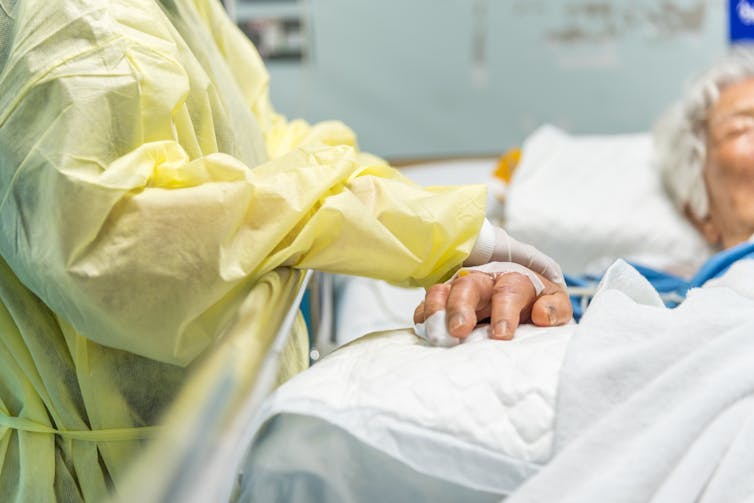
Shutterstock
Lisa Mitchell, Deakin University; Emma Tumilty, Deakin University, and Giuliana Fuscaldo, Monash University
Although most hospitals are coping right now, COVID-19 has brought up many questions about how health-care resources should be rationed during a pandemic.
Ideally, every unwell person should get anything they need to get better. But important resources like medications and hospital beds, including intensive care unit (ICU) beds, can become limited if demand outstrips supply.
We’ve had access to confidential documents outlining how various health services are to make decisions on who gets ICU resources in the event they become overwhelmed.
We found there’s significant variation between hospitals’ procedures on this front. And worryingly, the public doesn’t have access to this information.
Resource allocation in hospitals
Resource allocation procedures or triage plans help to work out who gets that bed, ventilator, or vaccine if and when the system comes under significant strain.
Ideally, these procedures should be created well ahead of when they might be needed, and be underpinned by three factors:
-
local context — what’s available/possible
-
medical evidence — what works, and for whom
-
ethical values — what we consider fair and the right thing to do.
The Victorian Pandemic Plan suggests health services should “adopt a systematic and transparent prioritisation of services as demand for treatment grows”.
It also says:
Triage will be enacted at the same level across the state, to promote equity of access of patients to intensive care.
Safer Care Victoria, the peak state body for quality and safety improvement in health care, had been preparing a document to guide hospitals on ethical resource allocation. But it only released this to the health services a few days ago, and the contents are considered sensitive and not for wider distribution within or outside the health services.
In contrast, Queensland Health released an ethical framework to guide clinical decision-making during COVID-19 in April, that’s available to the public.

Shutterstock
Different hospitals, different procedures
In the absence of a statewide approach in Victoria, most health services have developed their own resource allocation documents and triage plans.
To our knowledge, none of these documents are publicly available. But we’ve been able to informally review COVID-19 resource allocation procedures from a number of Victorian hospitals.
We’ve found these procedures vary in how ICU resources would be allocated to sick people (with or without COVID-19) in the event resources were scarce.
Some health services would use a standardised scoring system that predicts short-term survival (that is, the person deemed most likely to live would get the bed). But when they use the scoring system, and what additional criteria they take into account, varies between hospitals.
Some hospitals would use exclusion criteria based on certain health conditions. The types of conditions vary between hospitals. For example, one hospital would use a body mass index (BMI) above 40 to exclude people who are obese, while another would exclude people with alcohol dependency.
Read more:
Coronavirus and triage: a medical ethicist on how hospitals make difficult decisions
In “tie-breaker” situations, when it’s not possible to make a decision based on the scoring system, health conditions, or the severity of illness alone, hospitals may use tie-breaker criteria.
Tie-breaker criteria were also different across different hospitals. Some hospitals would prioritise pregnant people, sole parents, health-care workers, and so on. Others would not.
Several of the hospitals plan to use a team of experienced clinicians not involved in the patient’s care as a triage team. Some hospitals have indicated a lottery is the fairest thing to do in tie-breaker situations.
Hospital x, y or z?
Most hospital patients won’t need ICU-level support. Some people, even if they’re very unwell, may choose not to receive treatment in the ICU. And some people will not benefit from ICU care. But for anyone who might benefit, the different plans could mean different access depending on which hospital they go to.
For example, if you’re pregnant, it would be better to go to hospital x. If you’re a widowed parent with young children, you should go to hospital y. If you’re obese, you should try your luck somewhere other than hospital z.
Again, these resource allocation procedures are not publicly available, so we can’t provide information here to guide you.

Shutterstock
Variation in procedures across different hospitals is understandable in the face of uncertain medical evidence, or when available resources differ in local contexts, or because local communities have specific health needs. For example, you could reasonably expect variation between a smaller regional hospital and a bigger city hospital.
But where resources are similar — for example in two Melbourne hospitals only a few kilometres from each other, with overlapping catchment areas — plans should essentially be the same. If they’re not the same they should at least be publicly available.
It appears they vary, and the current lack of transparency around these resource allocation procedures means patients have no way of knowing whether they would be better to present at one emergency department over another.
Read more:
Social housing, aged care and Black Americans: how coronavirus affects already disadvantaged groups
Transparency and equity
The pandemic has highlighted various health inequities. In Victoria, the highest case numbers have occurred in areas with the greatest socioeconomic disadvantage.
Resource allocation is considered fair when processes are accountable, transparent, justifiable, and revisable. Where they’re not, they can further disadvantage people and communities.
If Safer Care Victoria and the individual health services were to make their ethical framework document and resource allocation procedures available to the public, this would allow for discussion and engagement, and where possible, enable people to choose which health service will serve them best.![]()
Lisa Mitchell, Conjoint Clinical Senior Lecturer in the School of Medicine, Faculty of Health, Deakin University; Emma Tumilty, Lecturer, Deakin University, and Giuliana Fuscaldo, Associate professor, Monash University
This article is republished from The Conversation under a Creative Commons license. Read the original article.

You must be logged in to post a comment.